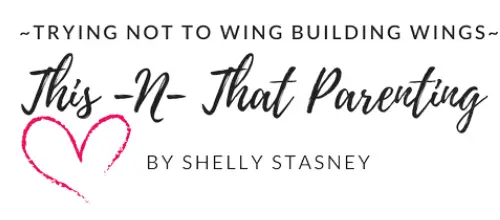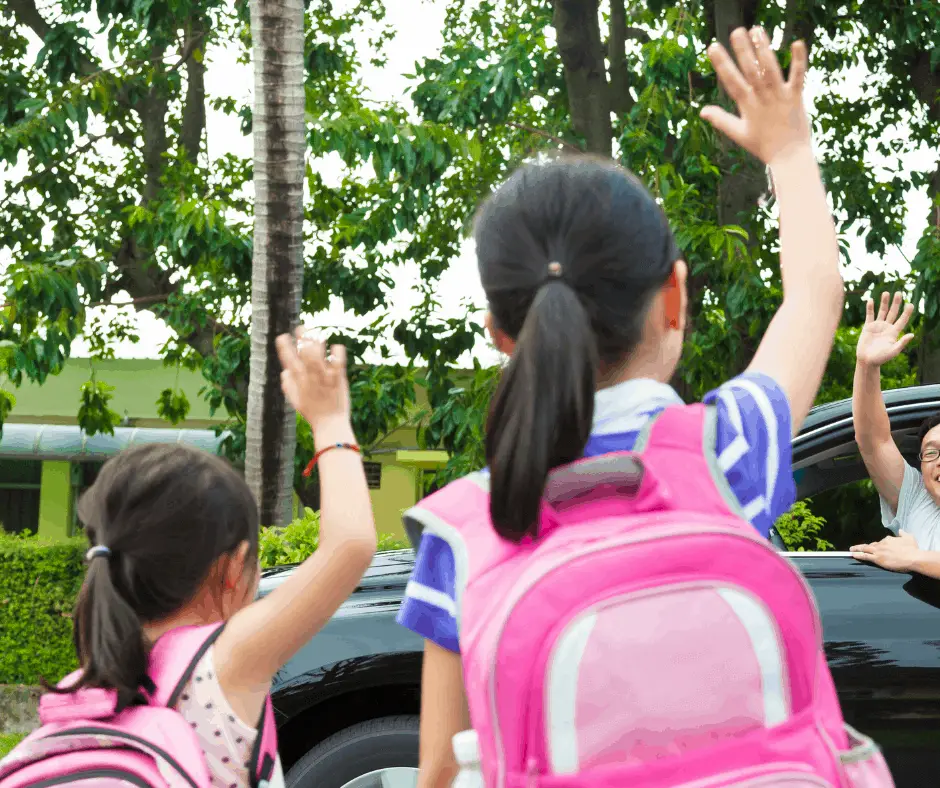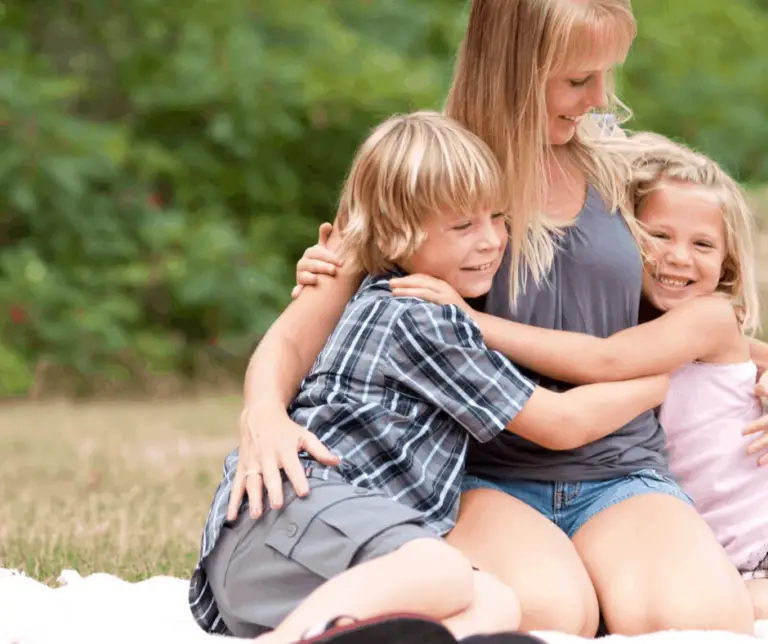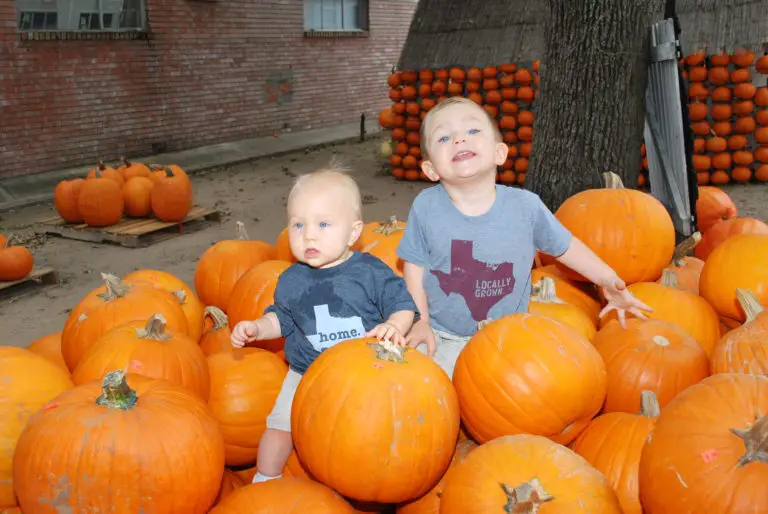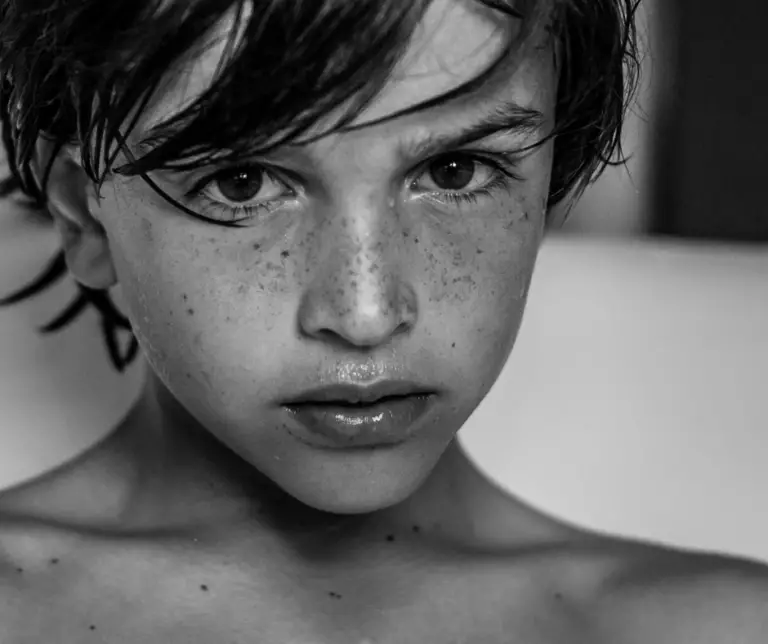20 Drop-Off Habits That Ease Separation Anxiety in Toddlers
Have you ever had to leave your child while they were crying and hollering, “Mama or Dada”, arms straight out towards you? Are you overcome by guilt as you walk away knowing your child is in distress? This has got to be one of the hardest things for parents to go through. Know that you are not alone. Many families are on the heart-wrenching separation anxiety roller coaster.
Today, I have FANTABULOUS news for you! There is hope. Kids get through it, and eventually, they won’t want to leave when you come to pick them up. In the meantime, I’m going to show you some simple habits you can implement to make the transition easier.
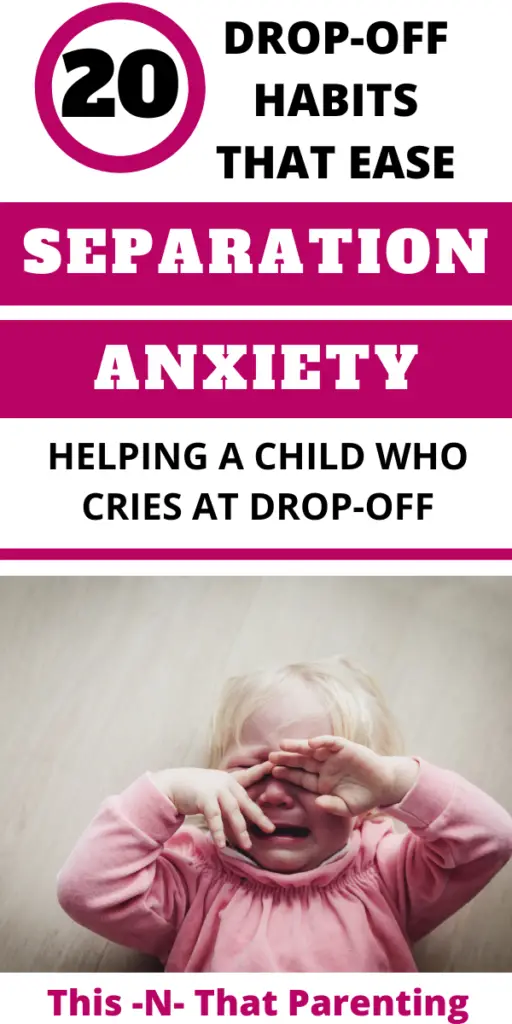
Separation Anxiety in Toddlers Makes Parenting Hard
Separation anxiety usually during the infant, toddler or preschool stages. For some children it lasts a short while, for others, it could last through all 3 stages. It goes without saying, this drama gives the whole family anxiety. There is hope. I’ve learned the hard way. I made many mistakes before I became intentional about helping my toddler overcome the anxiety. Now, I want to help your family get through this stage as quick as possible.
Nonetheless, separation anxiety in toddlers is totally normal. Until children are around the age of 6, their brain as developed the area that helps them to understand that when things or people leave they can come back. The best thing we can give them to best develop this is comfort and connectedness.
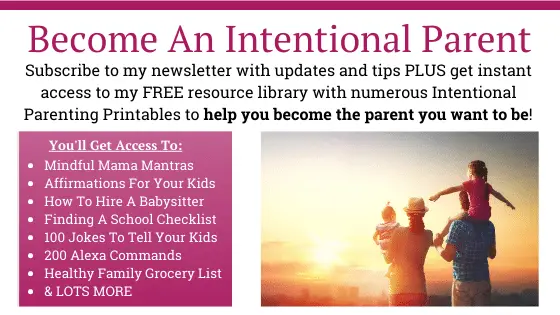
A Few Key Things For Parents to Keep in Mind
1.Time and patience are the key factors. 9 times out of 10 the child will quit crying before 5 minutes is up, and they will quit crying altogether the more they stay with this caregiver and form a bond.
2. Parents need to make sure they are not giving off any anxious vibes. For instance, I really had to keep this in check because I was a crier until first grade, so I had a lot of anxiety that my kids would take after me. Some of my teachers were less than adequate teachers, and I am paranoid the same could happen to my children. I have to pray for myself that I don’t pass my worries on to them! At the same time, when they cry at drop-off I’m triggered about my past, so obviously things start to snowball.
Long story short, it is important for parents to be in control of their emotions at drop-off. Use your alter ego to behave the way you would like to see your child behave at drop-off. When you model a stress-free goodbye with your child, they will be influenced by your positive energy.
3. Be intentional about the language you use at drop-off. Don’t say anything such as:
Don’t be a baby.
Be a big boy.
Don’t cry.
None of this is supportive or supports your child’s bond, trust, or attachment with you. Use supportive language.
I love you.
Have a great day.
Have a lot of fun. I’ll see you around 3:00.
Create a Goodbye Routine That Is Non-Negotiable
Without a doubt, you may run into caregivers who try to sway you to use the “rip off the band-aid” approach. There are times you may not be done saying goodbye to your kid and the caregiver was hauling them away screaming and crying.
Do not let a caregiver take over the situation unless you’re laying on the floor crying with your child. Make sure the goodbye routine goes according to your family’s set standards.
Be sure that your set routine is carried through at each drop-off. Then your toddler will gain confidence from the consistency and you will start to see the separation anxiety in your toddler diminish.
Experts suggest parents say goodbye quickly and go, but they don’t say – caregiver grab the kid and flee. Undoubtedly, be sure you create a consistent goodbye routine and stand your ground.
Psychologists say that you never flee without a goodbye. Why? If your child turns around and you’re gone, you are breaking trust! Not worth it.
Related Articles:
- Help, I Need Childcare! (What to Look For)
- How to Keep Your Promises With Your Child
- How to Send an Effective Email To Your Child’s Teacher: The Dos and Don’ts
20 Drop-Off Habits That Ease Separation Anxiety
- First of all, you have a discussion the day beforehand, even with 1-year-olds, that they will be staying somewhere tomorrow. Show your child pictures of the place if it is online. Describe getting ready, dropping them off, what they’ll do while you’re gone, all the way to pick up. That way, there are no surprises.
- Next, you want to facilitate your toddler’s bonding with the caregiver. If possible, introduce your child to the caregiver beforehand, tell your child what the caregiver’s name will be, or show them a picture of the caregiver.
- Remember to discuss in advance with the caregiver what she can do to comfort the child. Let the adults know ahead of time what they can do or what they can give your child to have less anxiety at drop-off. Is there a certain toy, pacifier, swing, stuffed animal that soothes your child?
- Start with short drop-offs. If possible, leave the child for shorter periods at a time and work your way up to full time.
- Develop a goodbye routine. It can be challenging to be consistent, but goodbye routines that are always the same are the best. You may want to develop a line that you tell your child every day at drop-off. Give them a brief hug, then tell them when you’ll see them next and depart.
- Similarly, Create an I Love You Signal to do as you leave.
- In addition, be sure to leave the child with a comfort object.
- Don’t sneak out! Don’t leave without saying goodbye. This is not about trying to make it easy for you. It is about leaving the child at ease and building trust. Sneaking away does not build trust.
- Keep goodbyes pleasant and brief.
- Prepare yourself for some crying. Have a plan in place. Know your goodbye routine forwards and backward. Play out the scene in your head before arrival. This way you can get through your own anxiety and be more relaxed for your child when they are experiencing their separation anxiety. Remember that this change will help your child adapt to different social situations.
- With this in mind, parents should stay calm, smile and not pass on anxious energy.
- Help your toddler learn that parents return. Discuss going and coming back. When you go on outings talk about how you’re leaving the house and take note of your return.
- Don’t be late for pick up. Come back when you say you are. Keep trust.
- Arrive early for pick-up.
- Ask the teacher how the rest of the day went. Keep a good open line of communication with the teacher. Let them know if you want to be contacted if things do or don’t get better. You may ask for a text when the child stops crying.
- Praise your child’s efforts. Even the smallest accomplishments.
- Discuss your child’s emotions with your child when at home. Your child needs to know that it is totally fine to express their emotions and that it is normal for kids to get upset when their parents leave. Let them know that you are there for them. Reassure them that you know there will come a time when they will have a cry-free drop-off. You can share that it is hard for you too, and explain how you get through it.
- It is super important to listen to your child’s feelings about the drop-off. Never dismiss their feelings or tell them how they feel. Show empathy and respect.
- Read books and watch movies about separation and drop off. Have a discussion about what you read and use ideas and characters from the books. I have given a plethora of resources at the end of this article.
- ABOVE ALL!! When discussing school, only talk about school and the employees in a positive manner in front of your child and in earshot. This is huge! If you do this one, you are shooting yourself and your child in the foot. Your child will wonder why you would leave them with someone you would speak of in such a manner. You may want to talk to other adults about the situation. DON’T DO IT in front of your child.
Resources That Ease Separation Anxiety:
**There are two Daniel Tiger Episodes that focus on separation anxiety: Daniel Goes to School and Daniel’s Babysitter. Watch these with your child and discuss how Daniel handled the separation and what your family’s takeaway will be from Daniel’s experiences.
Books to Help Children With Separation Anxiety:
Additionally, I have bought a lot of books on separation anxiety. I like to read about separation anxiety with my children. As a result, it is a segue into a conversation about how they feel at drop-off rather than bringing it up out of the blue. These are our favorites:
The Kissing Hand Book and Plush
These items are ones you can use year after year. Kids never tire of them. They are a great back-to-school tradition.
The Invisible String
This book is extremely versatile. Use it anytime you are going to be separated from your child.
Call to Action
In conclusion, you must do what works for your family. All of the drama and stress makes the whole family dread drop-offs, so make a plan.
If you feel anxiety dropping off your child remember to change your thoughts and feelings by using your alter ego. If you want to feel calm, act calm. You can’t wait for your thoughts and feelings to change, you need to change your behavior first. The kids catch on and the crying will slow over time.
Use the tips and resources to aid your family to ease into dropoff stress. Above all, remember that you are not alone and this behavior is very normal. Your child is behaving in this manner because this is what children do. Don’t take it personally or treat it as an emergency. Just be supportive, and find another adult to support you.
Want More On Connection?
- Bad Behavior Does NOT Mean Bad Kid
- Over 100 Proven Tips For Raising Boys: What A Boy Needs From His Parents
- 10 Easy Ways To Slow Down Time
- 25 Reasons All Children Should Be Listening To Music
- 21 MORE Ways To Say I Love You To Your Child By Showing It
- 21 Ways To Say I Love You To Your Child
- 7 Shocking Facts About The Development Of Your Child’s Prefrontal Cortex
- 4 Simple But Effective Ways For Connecting With Your Child
- 20 Drop-Off Habits That Ease Separation Anxiety In Toddlers
- The Importance Of Repetitive Family Vacation Destinations
Remember, there is hope, and you can ease separation anxiety in your child until they get past it!
If you have a tip or a book I didn’t list that helps with separation anxiety, please share in comments. If you have experience with separation anxiety that you’d like to share, please put in comments. I’d love to hear from you!
Make it a great day or not, the choice is yours! Remember to have fun, laugh and give God the glory! I love you! SS
